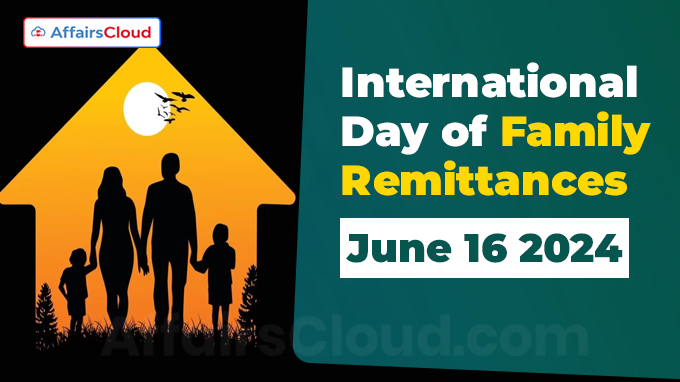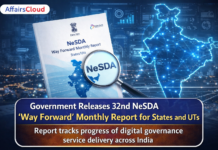 The United Nations (UN)’s International Day of Family Remittances (IDFR) is annually observed across the globe on 16 June to honour the dedication of millions of migrants who support their families and communities through remittances.
The United Nations (UN)’s International Day of Family Remittances (IDFR) is annually observed across the globe on 16 June to honour the dedication of millions of migrants who support their families and communities through remittances.
- IDFR highlights the economic impact of remittances on households, communities, and nations and recognises the sacrifice, separation, and generosity of migrant and diaspora communities.
Theme:
i.The theme of the IDFR 2023–2024 #FamilyRemittances campaign is, “Digital Remittances Towards Financial Inclusion and Cost Reduction.”
ii.The IDFR 2023-2024 Campaign theme highlights the benefits of digitalisation in lowering costs and improving access to financial services.
iii.It also commends the progress in providing affordable, safe, transparent, fast, and convenient remittance services domestically and internationally.
What is Remittances?
i.Remittances are typically any money transfers from a well-meaning individual or family member to another individual or household in the form of a bill or invoice or even a gift.
ii.When migrants send home part of their earnings as either cash or goods to support their families, these transfers are known as workers’ or migrant remittances.
Background:
i.On 16 February 2015, the IDFR, a universally recognised observance, was adopted by the Governing Council of the International Fund for Agricultural Development (IFAD).
ii.On 12 June 2018, the UN General Assembly (UNGA) adopted the resolution A/RES/72/281, proclaiming the 16 June of every year as the International Day of Family Remittances.
Note: IFAD is a specialised agency of the UN and an international financial institution, with the mandate to invest in rural people to eradicate poverty in Low- and Middle-Income Countries (LMICs).
Significance:
i.IDFR is a key initiative to implement the Global Compact for Safe, Orderly, and Regular Migration (Objective 20), focusing on reducing remittance transfer costs and promoting greater financial inclusion through remittances.
ii.Remittances support millions of families in achieving the Sustainable Development Goals (SDGs) by contributing to their poverty alleviation, education, healthcare, etc.
#FamilyRemittances Campaign 2020-2030:
i.The IDFR campaign contributes to publicising actions in the framework of the #FamilyRemittances Campaign 2020‑2030: “Support one billion people to reach their own SDGs”.
ii.By 2030 more than USD 5 trillion will be sent home by migrants to LMICs. Much of this money will directly go to the rural areas where 80% of the world’s poor live, facing food shortages and the impacts of climate change.
Points to Note:
i.Over 1 billion people are directly impacted by remittances annually, either as senders or as recipients.
ii.75% of remittance flows address food security, access to health services, education, and housing sanitation.
iii.The remaining 25% of remittance funds are either saved, invested, or used to set up businesses, among others.
Progress and Challenges in Global Financial Inclusion:
i.Since 2009, the average cost of sending remittances has decreased from 9.7% to 6.2% of the sent amount (based on sending USD 200 equivalent).
ii.Digital remittance services are even more affordable, costing around 4.6% of the send amount.
iii.Efforts to reduce gender gaps in account ownership have been successful, with the gap falling from 9 to 6% points in developing countries.
iv.SDG10.c is not on track for 2030, as remittance costs remain high and vary by region, with 14% of corridors still over 10% of the send amount.
- SDG10.c aims to reduce the transaction costs of migrant remittances to less than 3% and eliminate remittance corridors with costs higher than 5% by 2030.
Note: Based on the current trajectory, the transaction costs of migrant remittances will only reach 4.5% by 2030.
Key Facts:
i.Each year, 200 million migrant workers in 40 countries send remittances to over 800 million relatives in 125 LMICs.
ii.An average individual remittances of USD 200 to USD 300 a month help families buy food, pay for housing, and cover essential expenses.
iii.Globally, 1.4 billion adults are still unbanked and unable to access digital services.
iv.Most unbanked adults worldwide are women, with persistent gender, income, age, education, and workforce gaps in every region.
v.There are 135 million female adult migrants, globally remittances reach an estimated 400 million women annually.
vi.One-third (about 33%) of the global population remains unconnected to the Internet.
vii.760 million people worldwide do not have access to electricity, and close to 40% of adults in the LMICs do not have an ID.
Note: In 2023, the international remittances to LMICs increased by almost 4%, amounting to USD 669 billion.
About the International Fund for Agricultural Development (IFAD):
It was established as an international financial institution in 1977.
President– Alvaro Lario
Headquarters– Rome, Italy




